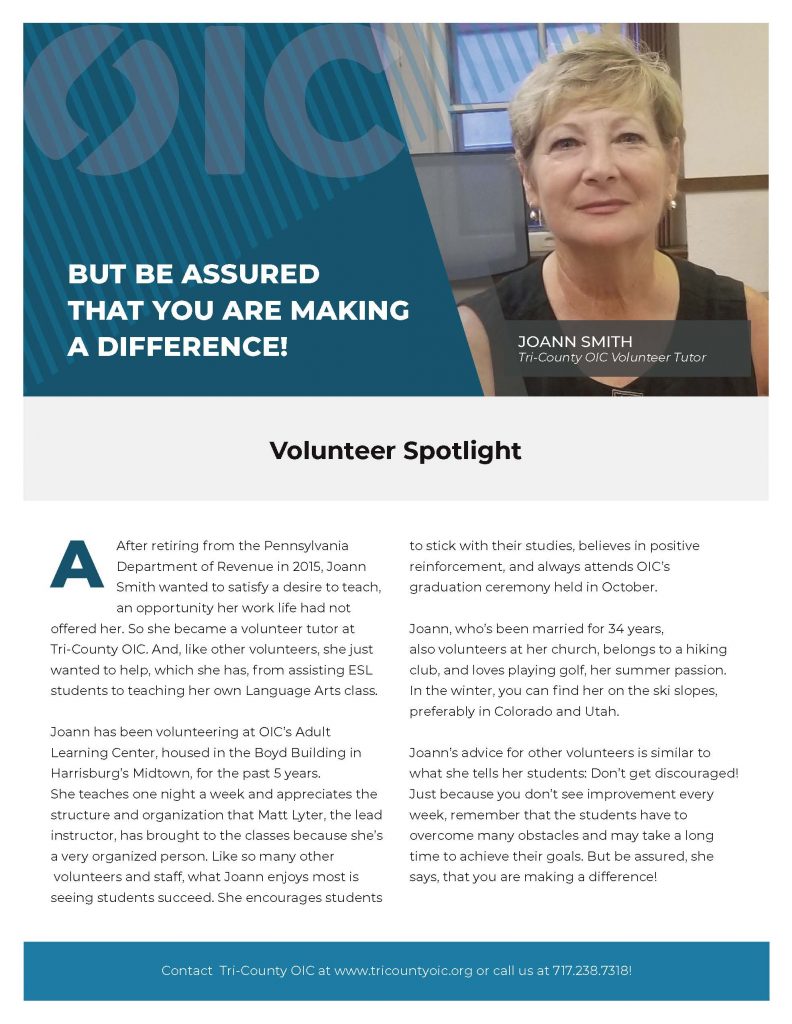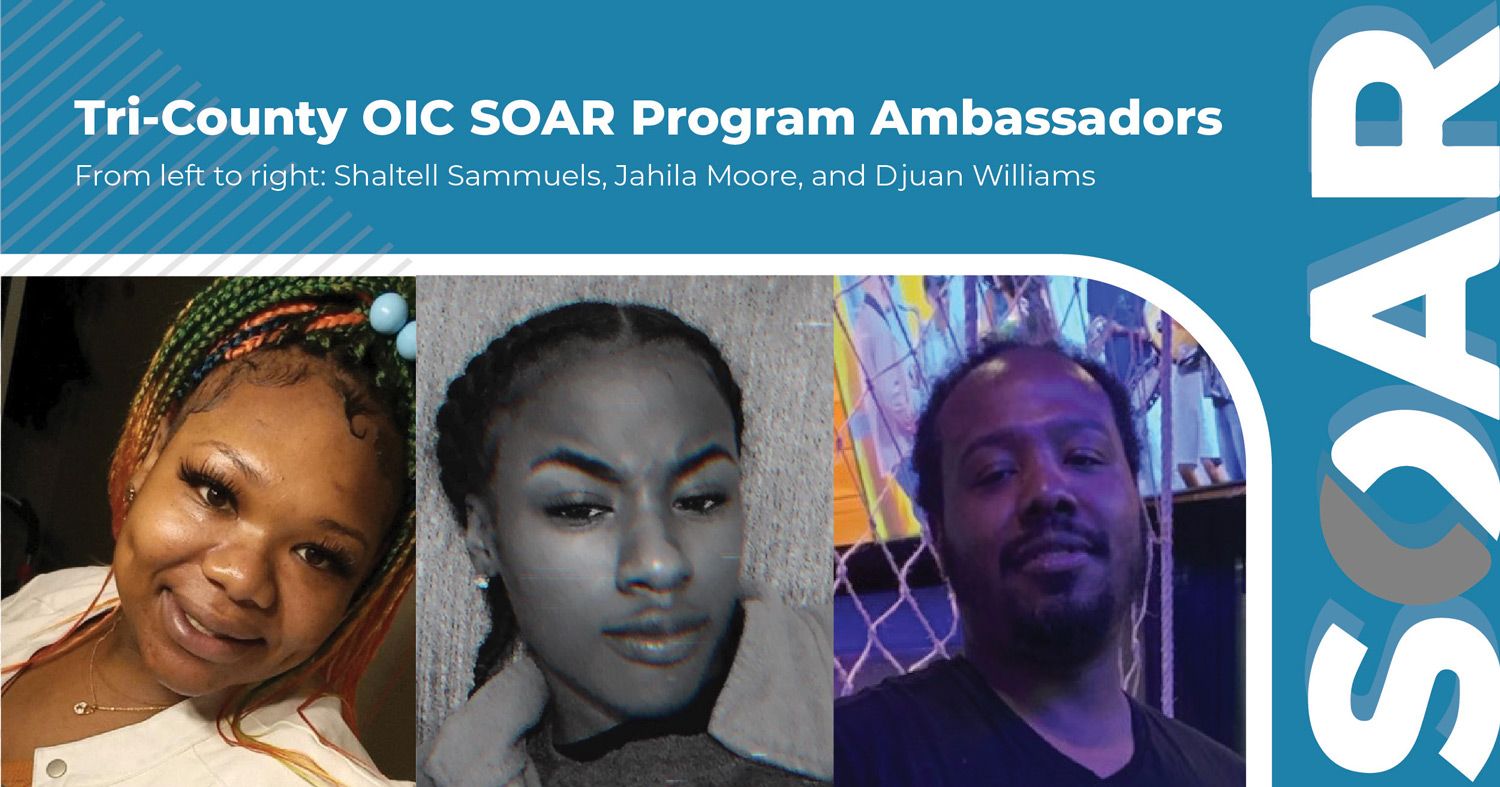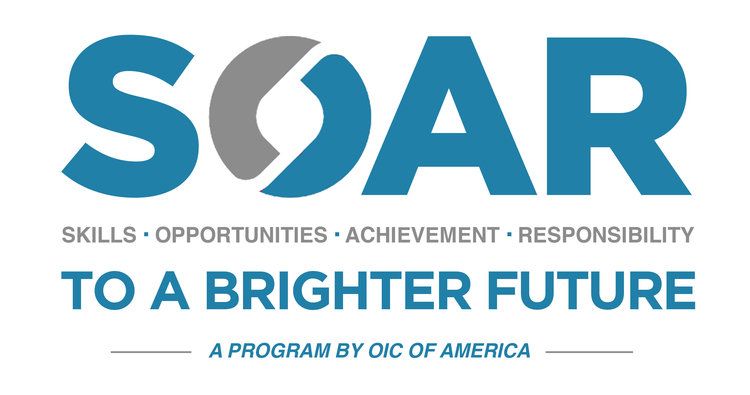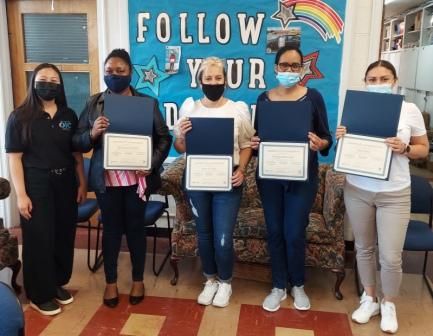CALL US: (717) 238-7318
Category: Uncategorized
Volunteer Spotlight – Ann Chadwell
Written by Christina Johnson on . Posted in Uncategorized. Leave a Comment
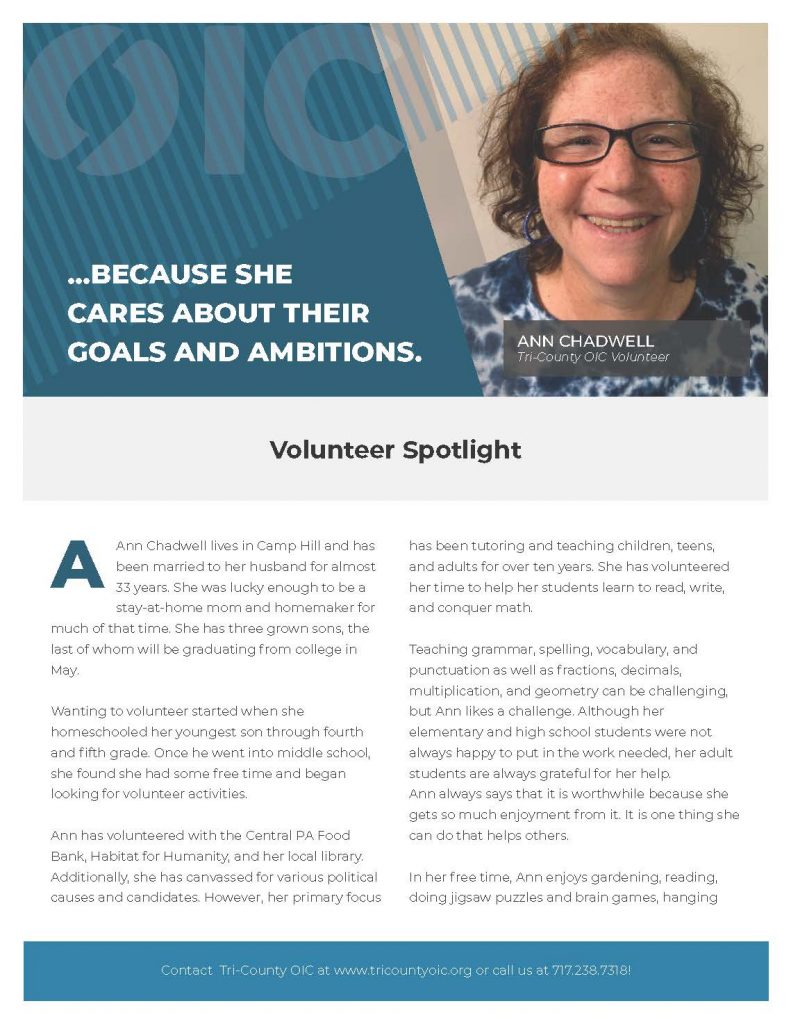
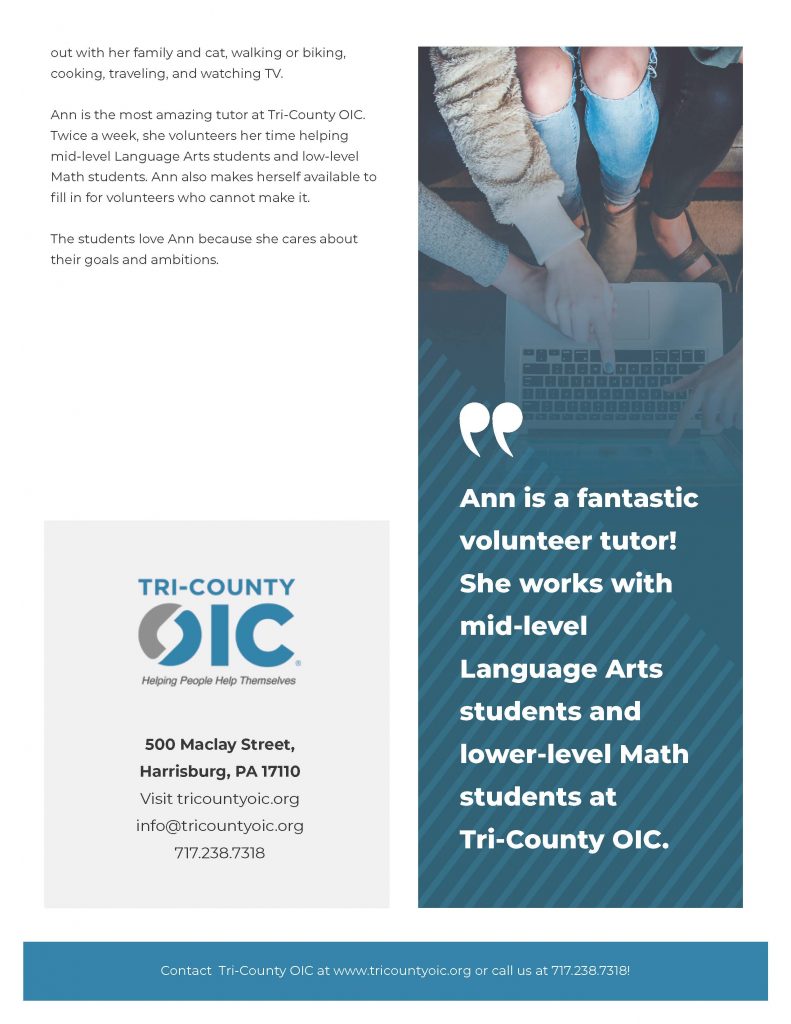
TRI-COUNTY OIC ALUMNI NAMED SOAR REENTRY PROGRAM AMBASSADORS
Written by Christina Johnson on . Posted in Uncategorized. Leave a Comment
February 28, 2022 – Tri-County OIC recently announced that Shaltell Samuels, Jahila Moore, and Djuan Williams have been named local Ambassadors to the SOAR (Skills and Opportunities for Achievement and Responsibility) Reentry Program. Samuels, Moore and Williams successfully completed the SOAR Reentry Program, which involves academic support, vocational training and credentialing, job placement and long-term follow-up.
As SOAR Program Ambassadors Samuels, Moore, and Williams will assist Tri-County OIC’s SOAR Program team with outreach, recruitment, participant engagement, building mentorship relationships, and more.
The SOAR Ambassador Program through OIC Of America awarded Shaltell Samuels, Jahila Moore, and Djuan Williams each with 4-month contracts to support their peers in reentry by fulfilling the SOAR Paid Ambassador duties, which include:
- Assisting SOAR team with outreach to improve participant engagement, recruitment and information sharing.
- Build authentic, long-term mentorship relationships with current, former and potential SOAR participants in the community, with the goal of supporting youth to stick to their own individual plans for change.
- Document engagement efforts and results to be input into online case management system.
- Attend Credible Messenger (CM3) foundation training, monthly cohort meetings and professional development sessions.
- Improve services to the SOAR participant community through facilitating peer support groups, planning culturally relevant events, etc.
- Serve as a broker to reconnect program alumni to SOAR’s pro-social activities, positive peer groups, and formal and informal community supports.
- Promote family and community engagement.
Learn more about Tri-County OIC’s SOAR Reentry Program.
###
OIC JOB & Community Resource FAIR Vendor Registration Form
Written by Christina Johnson on . Posted in Uncategorized. Leave a Comment
REGISTRATION DEADLINE: April 20, 2022
Registration and set-up time: 9:30 a.m. to 10:30 a.m. on the day of the event.
All space will be pre-assigned upon receipt of registration.
Tri County OIC will provide one table and two chairs.
Tri-County OIC will be hold hourly raffles for participants. Vendors can support the raffle by providing any items such as gift bag items, gift cards, water bottles, t-shirts, reusable bags, meal cards, transportation cards, etc.
Thank you in advance for your support
Event Coordinator: Tim Downing Recruiter
@ tdowning@tricountyoic.org
fax (717) 238-6251
For more information call: (717) 238 – 7318 x 135
Mary Hardy’s Story – From GED Graduate to Bachelor’s Degree
Written by Christina Johnson on . Posted in Uncategorized. Leave a Comment

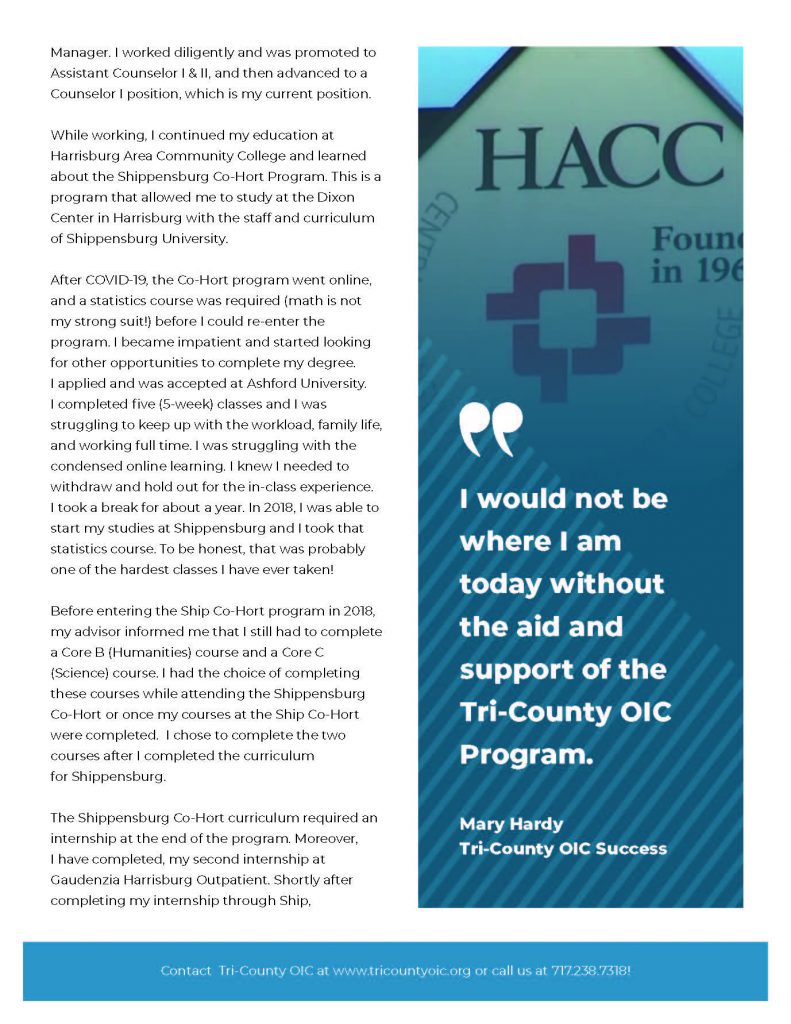
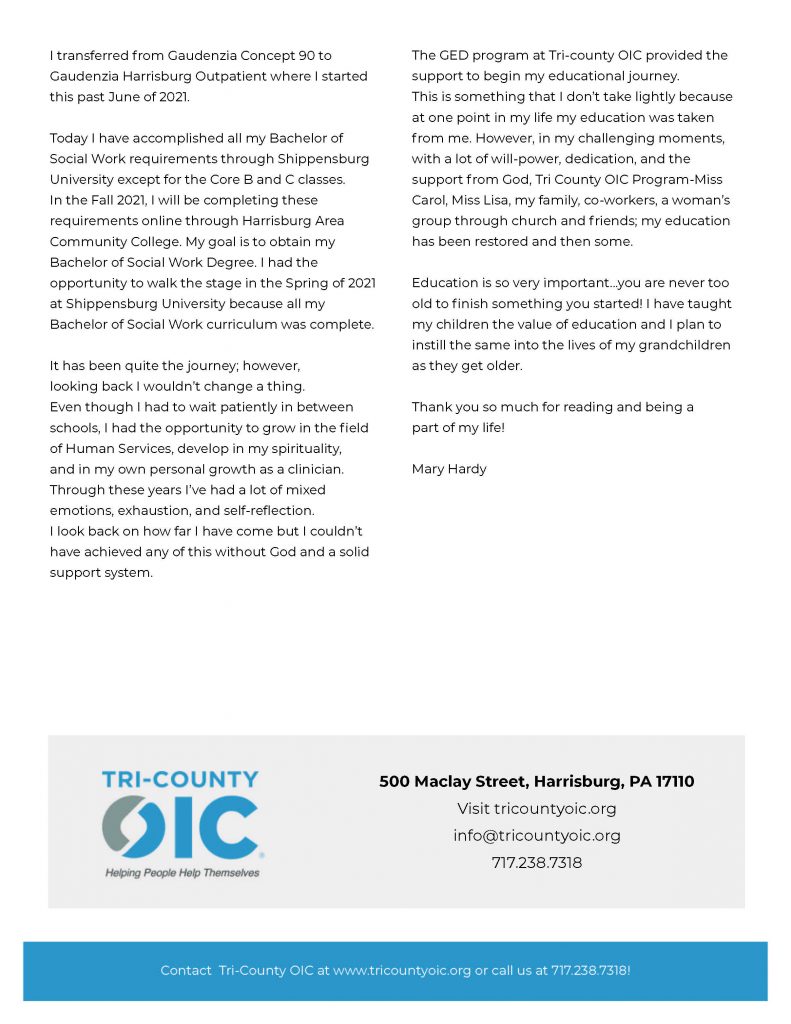
PI-PD Plan 2021-2022
Written by Christina Johnson on . Posted in Uncategorized. Leave a Comment
| Agency: Tri-County OIC |
| Agency PD Team (Admin and IHPDS): Jeffrey Woodyard, Christine Seay, Annette Reiff |
| ProLO Consultant: Sara Cole |
| PDE Advisor: Christine Houck |
| Guiding Questions to Prepare the Program Improvement-Professional Development (PI-PD) Plan |
| What program improvement priority/priorities will be the focus of the PI-PD Plan this year? Our priority is to focus on improving instruction and learner outcomes by emphasizing the relevance of what’s being taught in the classroom to students’ lives outside the classroom. In a paper titled “Effective Instructional Practice: Using Content Relevance” by Angela M. Hosek of Ohio University, Hosek noted, “The extent to which you make your course content relevant has a tremendous effect on learning outcomes such as student motivation, student liking for a course, and student empowerment.” In an article titled “Helping students find relevance,” Robin Roberson, a doctoral candidate at the University of Oklahoma, went even further. “No matter how disinteresting content may seem,” she wrote, “once students have determined that the content is worth knowing, then it will hold their attention and engage them. … As instructors, one of the most important things we do is provide relevance for students. It gives them a context within which they can develop into engaged, motivated, and self-regulated learners.” |
How did you identify your program improvement priorities? This year, we implemented a core curriculum across all classes and locations in an effort to standardize academic objectives, improve instruction, and increase learning. As we prepare new lesson plans, we are looking for ways to enhance those plans to achieve better academic outcomes that can be measured through better retention, higher enrollment, more EFL gains, and HiSET completions. |
Program Improvement-Professional Development Plan
| Program improvement-professional development objective(s): (Use SMART format: Specific, Measurable, Achievable, Relevant, Time-Specific.) You may list more than one objective. Objectives will focus on services to learners. At least one objective directs the work of a PLC. |
|
By (1) reviewing research on the link between relevance in the classroom and student engagement and (2) implementing research-based techniques for including relevance in lesson plans, instructors will increase students’ ability to state the relevance of the lessons being taught in the classroom to their personal or professional needs, interests, and goals. The objective will be measured by determining how many students can state one or more connections to real life with material taught during lessons that emphasize relevancy based on pre-and post-questionnaires and compare those results with the results of questionnaires administered after lessons that do not emphasize relevance. In addition, we aim to increase student participation in non-classroom centric, content-related activities, such as field trips, student driven research, etc., as they become more aware of how their academic studies apply — and can be applied — to the real world. 2)
3) |
| Data: You will need to list the data you are collecting related to each specific objective. |
|
Baseline data: (Where are you now, in relation to the objective stated above?) Currently, instructors informally include discussions about the relevance of the materials they’re teaching to their students’ lives, but the approach is hit or miss, is too often ignored, and is not assessed for impact. |
|
Target data: (Where do you aim to be at the completion of the action plan?) Our aim is to show an increase in the ability of students to state the relevance of their classroom work to their own lives to help them become more engaged and motivated learners. We will assess the results based on the outcomes of questionnaires, which will be administered before and after lessons that emphasize relevancy and compare them to the outcomes of questionnaires administered after lessons that do not emphasize relevancy. Specifically, we will be looking at the pre- and post-questionnaires included with lessons that emphasize relevancy to determine if more students are able to state one or more connections between the lessons and real life in the post-questionnaires than the number of students who are able to state one or more connections on the questionnaires after lessons where relevancy has not been stressed. Ultimately, we hope that the data will show an increase in the students’ academic learning as measured by EFL gains and HiSET completions and their involvement in supplemental educational activities aligned with classroom instruction. |
|
Mid-year data: (How will you know you are making progress towards your stated objective?) Instructors will review the findings of student questionnaires to enable them to determine if a formal focus on relevance leads to students better understanding the connection between what they’re being taught and their personal or professional needs, interests, and goals. Instructors will also determine whether students’ behavior has changed because of an increase in engagement resulting from a greater understanding of relevancy based on student comments, their involvement in outside activities, and increased class attendance. |
| Agency Needs |
| What types of support are you going to need to meet your objectives? We need meeting space and time to devote to the PLC meetings, time to enhance the lesson plans to meet the PI-PD’s objective, and funds to support non-classroom activities. |
|
How will the agency prepare staff with varying levels of knowledge and experience to participate in the PLC? Ongoing discussions will keep all instructors aware of the objective and how to meet it. Instructors will be provided with curriculum support for lesson plan enhancements. Veteran instructors will support newer, less experienced teachers as needed. |
| Professional Learning Community (PLC) |
|
What professional learning will the Professional Learning Community (PLC) engage in to meet the objective(s)? The PLC members will review research showing the link between relevance and engagement and determine which techniques suggested by the research to increase student understanding of relevance can be implemented in their classrooms based on their student populations and teaching styles. |
| Action Plan for Objective #1: | ||
| Meeting Date | Facilitator (Who leads the meeting? Who has the content expertise to support implementation of this plan?) | What will participants do in the meetings to meet the PI-PD objective? |
| September | Christine Seay and Annette Reiff | Participants will be introduced to the PI-PD objective, review research showing that increasing learners’ awareness of the relevancy of what they’re being taught increases student engagement, discuss research-based techniques to increase the focus on relevancy while presenting lessons, design a short questionnaire to be used to collect data, discuss the process involving teaching some lessons that emphasize relevance and some that don’t, and determine a timeline for implementing the process in each classroom. |
| November | Christine Seay and Annette Reiff | Participants will share a list of the lessons they will be using and gather ideas from other participants in a collaborative effort to determine the many ways that the lessons are relevant so that they can begin implementing the process. They will also approve the final pre- and post-questionnaire. |
| February | Christine Seay and Annette Reiff | Participants will share the results of their pre- and post-questionnaire data and discuss their findings to date. They will also share anecdotal evidence that students’ understanding of the connection between what is begin taught in the classroom and their lives outside the classroom is increasing, such as student comments, behavior changes, increased activities outside the classroom that are aligned with classroom lessons, etc. |
| June | Christine Seay and Annette Reiff | Participants will meet to discuss the final results of their questionnaire data and reflect on their findings. |
| Action Plan for Objective #2: | ||
| Meeting Date | Facilitator (Who leads the meeting? Who has the content expertise to support implementation of this plan?) | What will participants do in the meetings to meet the PI-PD objective? |
| Action Plan for Objective #3: | ||
| Meeting Date | Facilitator (Who leads the meeting? Who has the content expertise to support implementation of this plan?) | What will participants do in the meetings to meet the PI-PD objective? |
| Evaluating the Impact of Professional Learning within the Professional Learning Community (PLC) (Guskey, 2000) | |
| Level 1: Participants’ reactions |
1.) What do you want to know about participants’ reactions to the PLC? (Why are their reactions important?) Do they support the PI-PD plan objective? Are they familiar with the research showing the link between relevance and learning? Can they relate to the research findings while thinking about their own learning? Are they eager to implement the PI-PD plan in their classrooms? If the participants have buy-in, they will more enthusiastically implement the plan, which will give us more and better data. If they don’t support the objective, their implementation of the plan will be limited, which will dilute our findings. 2.) How will you assess participants’ satisfaction with the PLCs? We will monitor comments, suggestions, and concerns during the meetings and follow up comments after the meetings. |
| Level 2: Participants’ learning |
1.) At the end of each PLC meeting, how will you know if participants acquired the intended knowledge and skills of the meeting? Participants will be encouraged to voice ideas, concerns, and comments during ongoing discussions throughout the meetings. They will share comments about the research-based techniques they are implementing in their classrooms to emphasize relevancy and discuss how well they are working. Instructors who are successfully implementing the techniques will share their experiences with their colleagues. |
| Level 3: Organizational support and change |
1.) How will you support the job-embedded professional learning of staff to meet the objectives? (What organizational changes do you need to make, sustain, or communicate with participating staff?) Teachers who are unsure of how to implement the process will be mentored by one of the two IHPDSs or another instructor. 2.) On average, how many hours will each staff member participate in the PLC? Between PLC meetings, lesson plan prep, and classroom time, participants will average 2 hours per month for a total of approximately 18-20 hours. |
| Level 4: Staff use of new knowledge and skills |
1.) How will you know that participants are effectively applying the new knowledge and skills from ongoing PLC participation? Participants will share the results of their questionnaires and discuss findings and student reactions throughout the process. The results of the questionnaires will clearly indicate whether lessons that emphasize relevance made students more aware of the link between what they were learning in the classroom and their lives outside the classroom vs. lessons that did not. 2.) As a result of the professional learning for each objective, what evidence will you have of sustained staff change in practice? We probably won’t know this until the next program year when we learn if teachers are routinely focusing on relevance as part of their lesson plans. |
| Level 5: Impact on learners |
1.) How will you know that the work of the PLC participants impacted learners? We will measure the impact on students by looking at the results of the questionnaires to determine if formally emphasizing relevancy while teaching lessons increased the number of connections students stated between the material covered in class and their personal and professional lives. We will also refer to anecdotal evidence from the instructors on such metrics as changes in student behavior, outcomes, attendance, and activities they engaged in outside the classroom that are aligned with in-classroom academic studies. 2.) What specific evidence will you collect to show that the work of the PLC participants made an impact on learners? The student questionnaires will provide evidence of the impact or lack of it on learners. Specifically, we will count the number of connections students stated on pre-questionnaires before lessons that emphasized relevancy and the number of connections they stated on post-questionnaires after those lessons. In addition, we will count the number of connections students stated on questionnaires administered after lessons that did not emphasize relevancy and compare them to the number of connections they stated on questionnaires administered after lessons that emphasized relevancy. |
End-of-Year Reflection
| (Complete this section at the end of the year.) |
|
What changes did you notice from your baseline data to your end-of-year data?
|
|
What impact did your PLC activities have on participants’ professional practices?
|
| What changes have agency staff noticed in learner engagement/performance related to the implementation of skills/knowledge targeted in the PLC? |
Hiring Event – PSSI Looking for Workers
Written by Christina Johnson on . Posted in Uncategorized. Leave a Comment
Date: Thursday, September 9, 2021
Time: 9:00 a.m. – 12:00 p.m.
Where: 500 Maclay St. Harrisburg, PA 17110
Cost: FREE
Tri County OIC is committed to helping diversity-minded employers identify and hire the most qualified candidates, regardless of their race, ethnicity, and religion. As the workforce is becoming increasingly global and diverse, we are using technology to connect candidates to great organizations and important work.
HIRING EVENT INFORMATION:
Looking for work? PSSI hiring event! What Does PSSI do? PSSI is looking to further their dedication to food safety, PSSI is dedicated to developing chemical products and equipment and pairing them with our proven procedures to streamline your sanitation processes.
What will you be doing? PSSI has a variety of different positions ranging from Cleaning Warehouse Environments to Cleaning the the Trucks for the warehouses.
Our goal is to give employers and prospective employees throughout the region a chance to meet, discuss job opportunities and find employment. Job seekers are encouraged to attend and there is no cost in doing so.
This Event is Spotlighting PSSI in Harrisburg, PA. It will allow you to discover information about PSSI and what they are looking for. Sending your resume every day and not getting a response can be very tiresome, so bring your resume with you and have an on the spot interview! Dress professional and give your best first impression at this Event. You could be the next Best Hire.
For more information contact:
Isaac Sloan
Employment Specialist
717.238.7318
isloan@tricountyoic.org
Pathway Home – A Second Chance Program
Written by Christina Johnson on . Posted in Uncategorized. Leave a Comment

Pathway Home – A Second Chance Program
Tri-County OIC, Pathway Home program aims to build a bridge between pre-release and post-release services for individuals transitioning back into the Harrisburg community.
Tri-County will assist in guiding individuals housed in Dauphin County Prison, Camp Hill SCI, Phoenixville SCI, Chester County SCI, and local correction facilities transition from pre-release to post-release as they return to the Harrisburg community.
Individuals, who are within 20-180 days of returning to the Harrisburg area will be assigned an OIC case manager. The case manager will provide supportive services as well as counseling to guide the program participant from pre-release to post-release life. Pathway Home offers services such as continuous case management, educational achievement, vocational training, employment assistance employment placement, community referrals and financial award for milestone achievements.
The Tri-County OIC Pathway Home is funded by OIC of America through a grant from the United States Department of Labor’s Employment and Training Administration.
For more information about the Pathway program contact Letitia “Joy” Young, Program Manager at jyoung@tricountyoic.org.
Students Received Direct Care Worker Certificates
Written by Christina Johnson on . Posted in Uncategorized. Leave a Comment
Congratulations to (pictured left to right) Memouna Karambiri, Diana del Valle, Wezenet Mehbrahtu, and Ines Nares who recently received their Direct Care Worker certificates of training from the Center for Independent Living of Central Pennsylvania (CILCP). Also pictured is Alexis Vang, ESL Instructor.
On Tuesday, June 15, 2021, CILCP conducted on-site Direct Care Service Training at Tri-County OIC, 500 Maclay Street, Harrisburg, PA. Nathan Taraska, Training Specialist for CILCP, along with his team, conducted a 5-hour training. During the training session students learned the fundamental concepts needed to become an entry level direct care service worker. The students were eager to participate in the direct care worker training in which they learned about the ins and outs of providing care service for homebound residents who are unable to perform routine daily activities of living without assistance.
CICLP staff made the students welcome by offering training in a small comfortable environment. They also provided a lite breakfast and delicious sandwich from Jimmy John’s for lunch. In addition to the great food, all the training materials and study resources were provided.
At the end of the training session, the students participated in a Q&A session. During the Q&A session, other CICLP employees, including direct care workers (one of whom was a former OIC GED graduate) employed for service agencies gave insight to what it meant to be a direct care worker and what the work involved.
The following day, the students’ teacher, Alexis Vang, practiced mock interviews, prior to attending a Direct Care Worker hiring event at OIC. What an experience! Everyone agrees that the training was a great success.
At OIC, we provide new opportunities for clients of diverse backgrounds. We take measures to prepare our students for higher education and the workforce.
Through our offered educational programs, training, and hiring events, we provide a streamlined pathway that prepares our clients for success. Our students with language barriers are supported through our ESL classes, before sending them through training to enter the workforce.
We believe in supporting these students as they reach their goals to improve their English language use and overcome their fears.
If you are interested in the next Direct Care Worker training at OIC contact Alexis Vang at avang@tricountyoic.org.
Opportunities in Careers
Written by Christina Johnson on . Posted in Uncategorized. Leave a Comment
Opportunities in Careers is a Virtual Information Session featuring employers from the Greater Harrisburg area.
These webinars will be held the 4th Wednesday of each month from 12:00 p. m.—1:00 p.m.
We meet remotely on ZOOM
Meeting ID: 882 4721 0090
Passcode: 815834
Every month we launch a new webinar designed to give our students, relatives, friends and community employment information from employers who are looking to hire qualified people.
For more information contact:
Alfred Sloan
Employment Specialist
717.238.7318 x 124
asloan@tricountyoic.org
- 1
- 2
ABOUT US

Tri-County OIC is a community-based, non-profit, Federal, State, local, foundation and supporter funded organization, which is part of a greater nationwide alliance of OIC’s.

JOIN OUR LIST

Stay up to date on Tri-county OIC programs, services and events.
CONTACT US

Hours of Operation*:
Monday - 8am to 8pm
Tuesday - 8am to 6pm
Wednesday - 8am to 8pm
Thursday - 8am to 8pm
Friday - 8am to 1pm
Saturday & Sunday - Closed
* Business hours subject to change during holidays
© 2025. Tri-county OIC. Website
